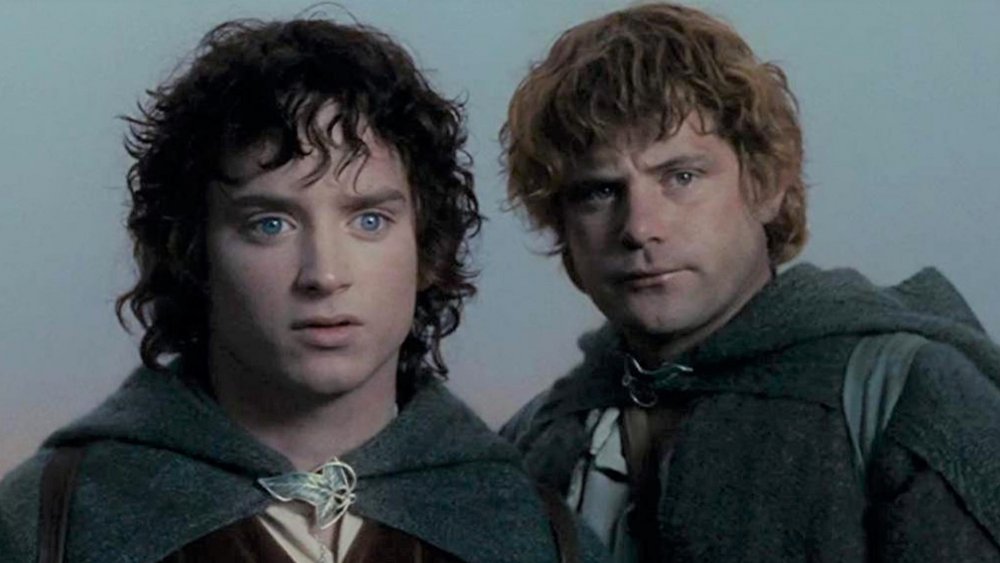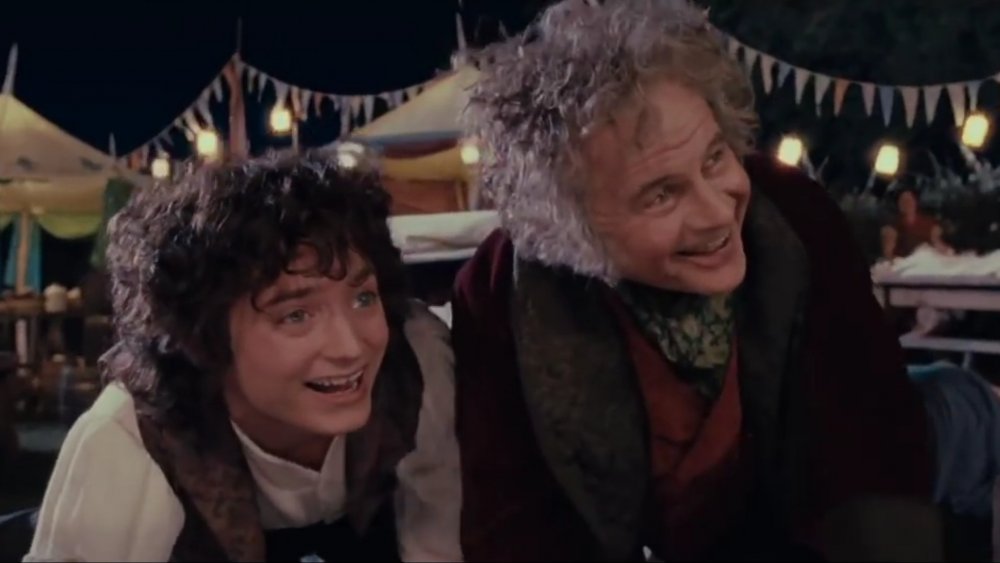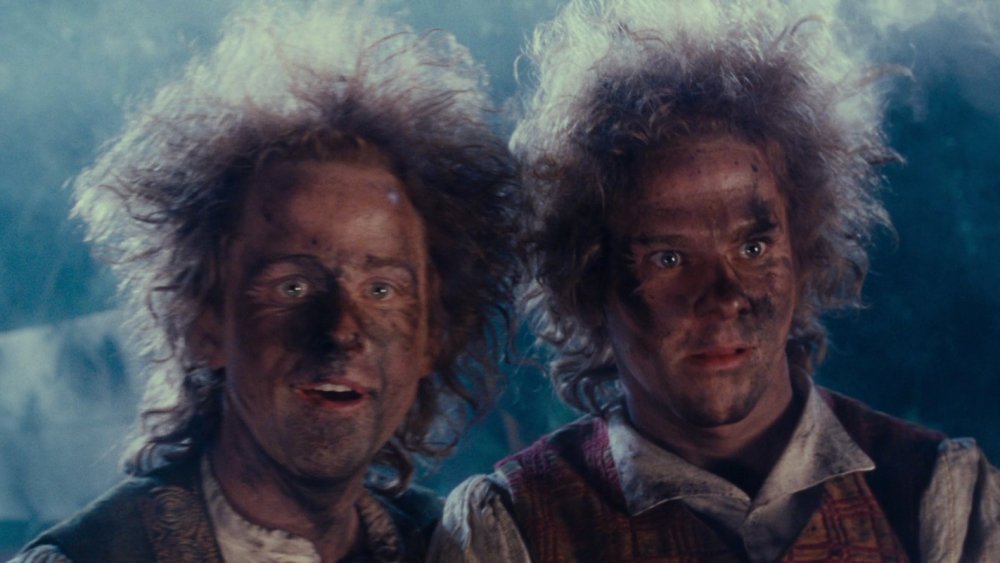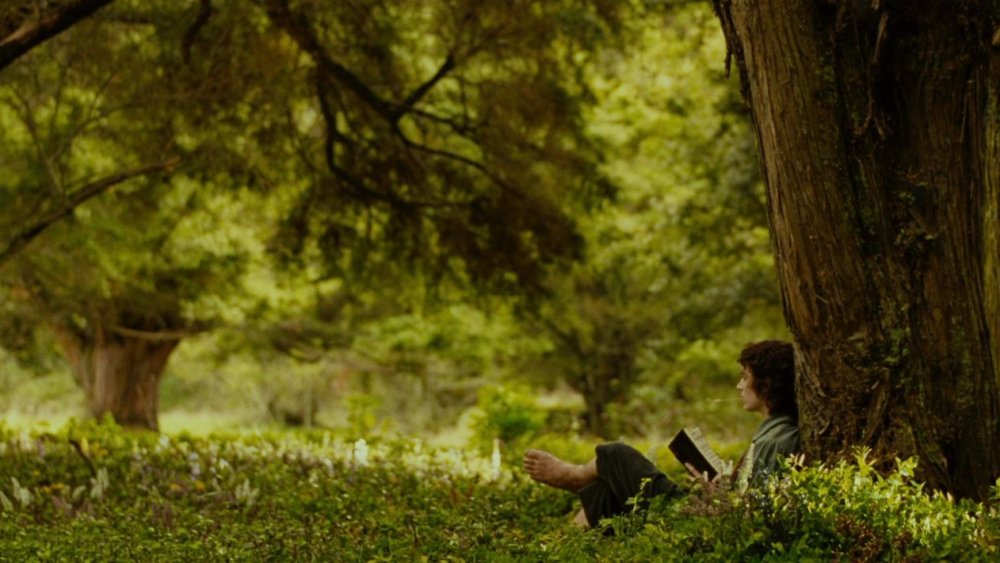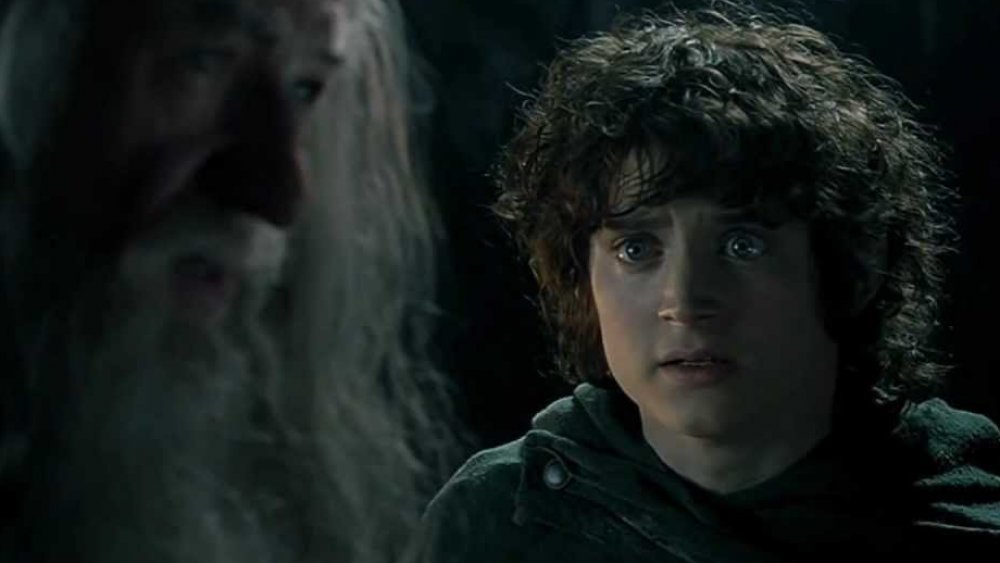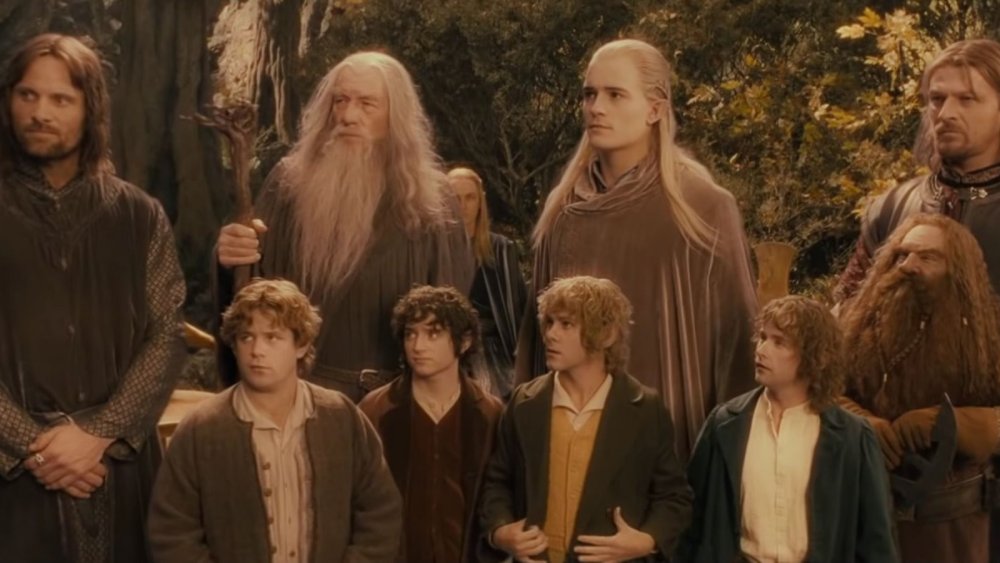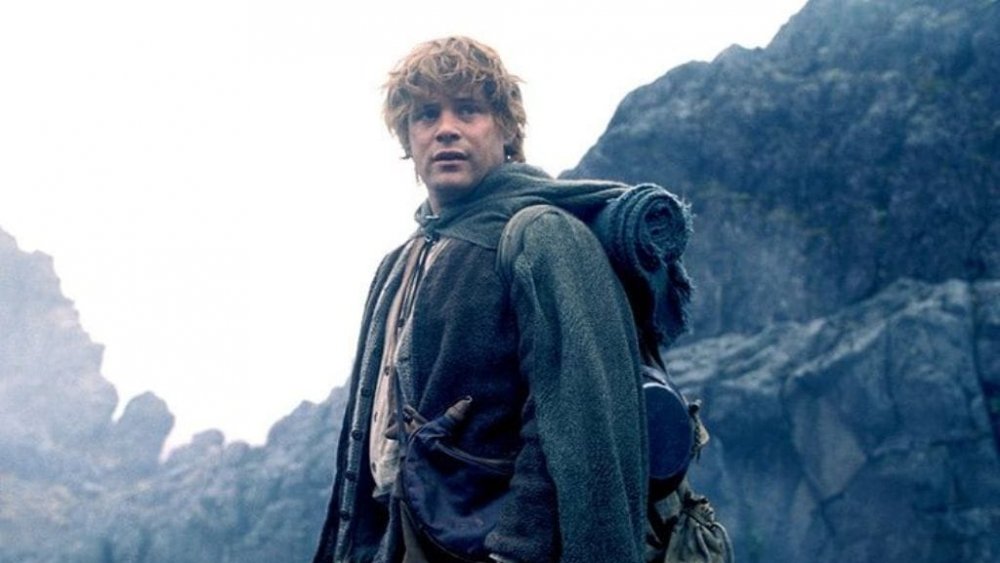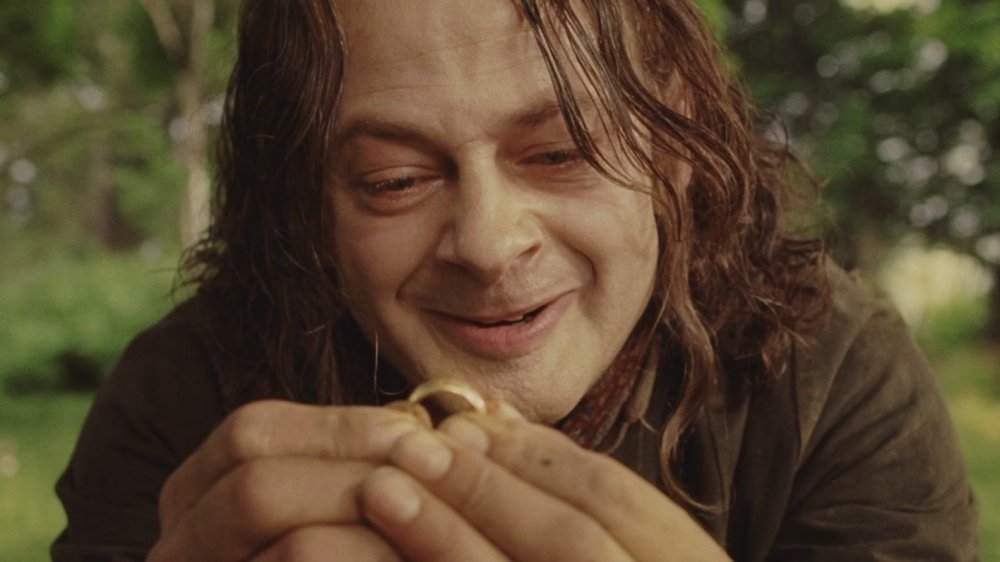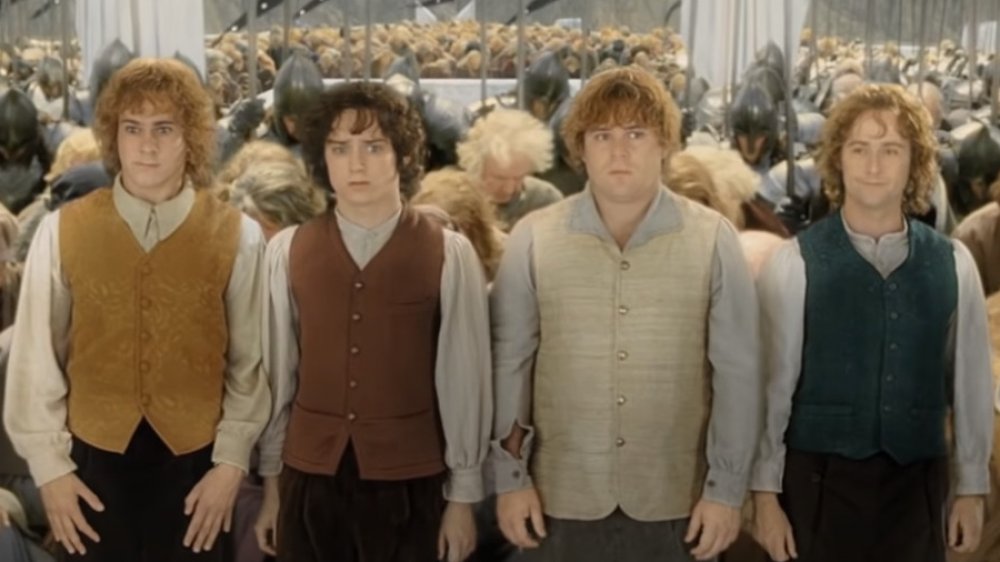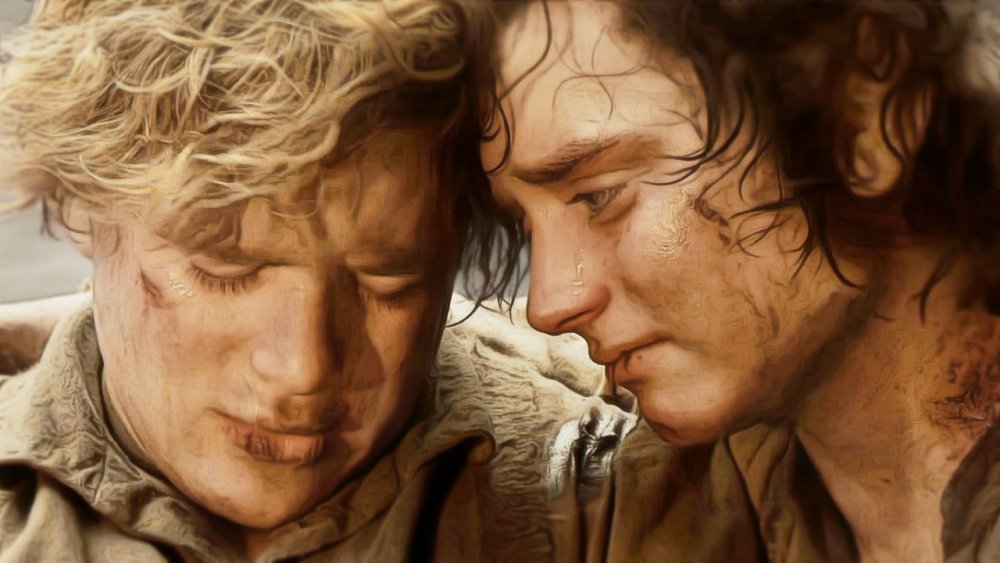Why The Hobbits Are The Best Part Of Lord Of The Rings
J.R.R. Tolkien's The Lord of the Rings is one of the most influential fantasy stories ever written, and director Peter Jackson's adaptation of the epic was a game-changing cinematic event that's still rippling through Hollywood today. When you experience it, you just know that The Lord of the Rings is the perfect mix of adventure, magic, and pure, human emotion told through a struggle between light and darkness for the fate of the world.
And there are a lot of reasons why Lord of the Rings fans are so emotionally fulfilled by the story, from the complex mythology Tolkien laid out in his writing to the incredible production design Jackson and his team brought to their films, but none of that would matter without the characters at the core of the story. And chief among those characters are four hobbits who have pivotal roles to play in the battle. The hobbits aren't the flashiest characters or the strongest, but they're without question the best and most important part of The Lord of the Rings. Here's why.
The hobbits love their simple pleasures
The Lord of the Rings is a monumental story of the eternal battle between good and evil, and it's established fairly early on that the stakes absolutely couldn't be higher. Sauron is after the One Ring, he's using every possible resource at his disposal to get it, and once he gets it, he'll overrun every part of existence with his dark armies. If our heroes beat Sauron, they save their way of life. If they don't, no one has a way of life anymore.
With that in mind, it stands to reason that a lot of characters in the story don't really take the time for basic pleasures in life. Yes, Gandalf has his pipe, and Aragorn certainly holds the love of Arwen very dear, but these are warriors out to win at all costs. That's one of the reasons why it's so refreshing to have the hobbits around. No matter how dire the situation is, they just can't let go of their love of simple pleasures.
In the film version of the trilogy, we see this first when Sam, Merry, and Pippin decide to make a fire for their meal on Weathertop despite the danger, and then when Pippin asks Aragorn about his "second breakfast." We see it again and again throughout their adventures, from the salted pork at Isengard to Sam's cheerful insistence that he keep a box of seasoning on hand in case he happens to get to roast some chicken. Hobbits are always prepared to indulge in small comforts, if only for a moment.
The hobbits have a great sense of humor
The events of The Lord of the Rings are often serious at best and grim at worst. After all, the characters are almost always in the middle of life-or-death situations that affect not only them but the fate of the whole world. Everyone has a tremendous burden on their shoulders all the time, and though there's some levity scattered through story, it can be a little hard to come by. It's here, again, that the hobbits shine through, even amidst the magic of the elves and the hardiness of the dwarves.
The hobbits aren't necessarily happy all the time, but there's something about their slight outsider status in the midst of this conflict — there's no hobbit army, after all — that allows them a different perspective, and much of that perspective involves the infusion of humor into the situation. Many times, it's nervous humor, but the laughter comes all the same, whether it's Merry and Pippin celebrating the liberation of Isengard or Sam doing his best to keep Frodo's spirits up on the long walk to Mordor. Somehow, even in the darkest moments of the story, the hobbits never completely give in to despair.
Their curiosity helps save the day
The events of The Lord of the Rings as we know them might've happened eventually without hobbits figuring into the story, but they wouldn't have happened the same way if not for the intellectual curiosity of these hole-dwelling creatures. After all, it was Bilbo Baggins who brought the One Ring back out into the light in the first place, rescuing it from Gollum's cave and keeping it for himself for years before Sauron realized what was going on. And that wouldn't have happened if Bilbo hadn't been curious enough to hang on to the ring and explore its power in the first place, and that sense of curiosity carried over into the next generation.
The other members of the Fellowship of the Ring are much more purpose-driven than the hobbits, three of whom come along for the journey simply to support the fourth one, Frodo the Ring-bearer. Surrounded by warriors, all of whom see their mission as a tactical one, the hobbits are just as much adventure-driven explorers as they are participants in a conflict, and that leads them places the other characters simply might not expect. Frodo realizes Gollum is following them, Merry learns how to befriend the ents and convince them to join the cause, and they manage to avoid Ringwraiths all because they're curious enough to pay attention to their surroundings.
We love the way they win with their wits
There are a lot of characters in The Lord of the Rings who could be classified as absolute champion fighters. Aragorn is the best swordsman anyone has ever seen, Gimli is deadly with an axe, and Legolas is a supernaturally gifted archer. Then there's Gandalf, who rides a monster down through a cave and comes back from the dead even more powerful. Compared with those characters, the hobbits in the story are lacking in physical strength, but they more than make up for it with their wits.
Like Bilbo before him, Frodo understands that he must be smart in order to survive, and we see him demonstrate that through wearing his mithril shirt when it's needed most and figuring out things like the passphrase to enter Moria. We see Sam use his cleverness in the fight against Shelob and in the way he manages to keep Frodo alive even when it seems all hope is lost. And of course, we see it in the way Merry and Pippin manage to convince a bunch of stubborn ents to go marching to war.
The hobbits always rise to the occasion
The people of the Shire are, despite Bilbo's previous journeys to the Lonely Mountain, by and large not especially interested in quests and grand achievements. Yes, Bilbo became a legend because of that trip, but even those closest to him seem pretty content to just relax in the Shire, smoking their pipes and eating cheese and bread and generally just enjoying the green beauty of the world around them.
For Frodo, Sam, Merry, and Pippin, that changes when they're roped into an ages-old conflict with the fate of all of existence hanging in the balance, but it's worth noting that they all had the opportunity to give up pretty much any time they wanted to. Frodo could've passed the ring off to someone else, even if they hadn't been equipped to handle it, and gone home and hoped for the best, with Sam in tow. Merry and Pippin, who weren't supposed to be a part of the journey to begin with, also could've turned back to hang up their traveling cloaks and have a pint at the Green Dragon. None of these hobbits are princes or nobles or sorcerers. They're just simple young men who decided they had to step up when the moment called for it, and that determination makes them all the more admirable.
The power of Samwise Gamgee
There are a lot of heroes in The Lord of the Rings. There's Aragorn, the reluctant heir to the throne of men who's determined to see the War of the Ring through. There's Gandalf, the wizard who still believes in the power of the mortals to affect change on their world. There's Frodo, the determined Ring-bearer who's willing to put his life on the line and carry a burden for the rest of the world. But even among those heroic figures and many others, no other hero stands out quite like Samwise "Sam" Gamgee.
When we first meet Sam, he's a gardener who's just happy to tend his plants and dream about perhaps one day starting a family with the girl he loves in the Shire. Then, when it becomes clear that Frodo needs him, he leaps into service, dedicating himself to helping his friend in ways both small and large. What begins as a kind of servant-master relationship quickly evolves into something more, though, and the burden placed on Sam becomes arguably greater than the one placed on Frodo. As the One Ring works its magic on its bearer, seeping into Frodo's mind and poisoning him even against those who love him most, Sam has to carry not just his own weight but Frodo's, all the way to the fires of Mount Doom. The Lord of the Rings wouldn't have the happy ending it does without Sam, and that makes him not just the greatest hobbit but the greatest hero of the whole story.
They break a cycle of darkness
Long before the hobbits at the center of The Lord of the Rings were born, there were Smeagol and Deagol, two hobbits (or, at least, hobbit-like creatures) who stumbled upon the One Ring while they were out fishing one day. Overcome by its power, Smeagol killed Deagol, slowly transformed into Gollum, and was poisoned forever by the One Ring's dark influence. His desire for the ring, his "precious," was so great that he pursued it all the way to Mount Doom, long after Frodo had become the Ring-bearer.
Then there's Bilbo, who became the Ring-bearer after Gollum and, despite the long life the ring gave him, was also poisoned by its influence, to the point that he seemed ready to lash out at his nephew and his best friend, Gandalf. In many ways, Smeagol and Bilbo represented the only previous major hobbit entries into the affairs of the rest of Middle-earth, and both were corrupted by darkness. By doing their part to destroy the One Ring in the end, the hobbits of The Lord of the Rings broke a centuries-old cycle of darkness and corruption, and in their own way, they managed to redeem Smeagol and Bilbo in the process.
The hobbits don't care how others see them
In many ways, the role of the hobbits in The Lord of the Rings could be viewed as a very on-the-nose metaphor for the role of "the little guy" in any major world event. Each of the four major hobbit characters spend most of the story in over their heads, determined to press forward even if they don't have the strength, wisdom, or courage of the bigger men and women around them. By the end, most of the battlefield glory has gone to others, while the great deeds of the hobbits often happened when others couldn't necessarily see them, especially in the case of Frodo and Sam.
Which is why it's so wonderful at the end of The Return of the King film when, upon being crowned king of Gondor, Aragorn takes a moment to single out his four friends from the Shire when they attempt to bow to him. Instead he stops them and says, "My friends, you bow to no one." He then leads his entire court in a coordinated show of respect. It's a reminder that, for the hobbits, none of it was ever about glory or grandeur, but they deserve a moment of glorification anyway.
Frodo and Sam's love story is the best part of The Lord of the Rings
There's romantic love in The Lord of the Rings, though it never entirely takes center stage. Aragorn and Arwen have their moments, as do Aragorn and Eowyn and, eventually, Eowyn and Faramir. And, of course, Sam has his crush on Rosie Cotton that eventually turns into something special. Aside from that, it's largely a story about a group of straight males from various races who have a job to do. That doesn't mean there aren't other love stories within the narrative, though. In fact, huge chunks of The Lord of the Rings are devoted to celebrating the sort of brothers-in-arms love that these comrades develop, and nowhere is that more powerful than the love between Frodo and Sam.
It's been said that no one can know what a relationship is really like except for the two people who are in it, and that sentiment is summed up perfectly by a moment near the end of Peter Jackson's The Return of the King, when Frodo wakes up in Rivendell. Rather than jumping up to celebrate with his friend, as the other hobbits do, Sam simply stands in the doorway as the two share a look. It's a revealing moment that tells us these two have nothing left to prove to anyone else or to each other. They have a pure, quiet, tested and true bond that won't ever be broken.
